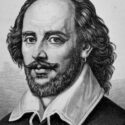Artist Profile
Shakespeare (1564 – 1616) was probably educated at the King Edward VI Grammar School in Stratford, where he learned Latin and a little Greek and read the Roman dramatists, after which he went to London to begin his apprenticeship as an actor.
In 1594, Shakespeare joined the Lord Chamberlain’s company of actors, the most popular of the companies acting at Court. In 1599, Shakespeare joined a group of Chamberlain’s Men that would form a syndicate to build and operate a new playhouse: the Globe, which became the most famous theater of its time.
Shakespeare was regarded as the foremost dramatist of his time. In his poems and plays, Shakespeare invented thousands of words, often combining or contorting Latin, French, and native roots. His impressive expansion of the English language, according to the Oxford English Dictionary, includes such words as: arch-villain, birthplace, bloodsucking, courtship, dewdrop, downstairs, fanged, heartsore, hunchbacked, leapfrog, misquote, pageantry, radiance, schoolboy, stillborn, watchdog, and zany.
Shakespeare wrote more than thirty plays. These are usually divided into four categories: histories, comedies, tragedies, and romances. His earliest plays were primarily comedies and histories such as Henry VI and The Comedy of Errors, but in 1596, Shakespeare wrote Romeo and Juliet, his second tragedy, and over the next dozen years he would return to the form, writing the plays for which he is now best known: Julius Caesar, Hamlet, Othello, King Lear, Macbeth, and Antony and Cleopatra. In his final years, Shakespeare turned to the romantic with Cymbeline, A Winter’s Tale, and The Tempest.
Sometime after 1612, Shakespeare retired from the stage and returned to his home in Stratford. He drew up his will in January of 1616, which included his famous bequest to his wife of his “second best bed.” He died on April 23, 1616, and was buried two days later at Stratford Church.

